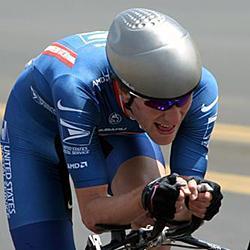
Recently on Cyclingnews.com |
An interview with Dave Zabriskie, December 26, 2004
Things can only get better
By Anthony Tan
After four years with the Blue Train, it's time to move on. This amiable but audacious 25 year-old has found a new lease of life at Team CSC, a team that has a reputation for bringing out the best in individuals and as a collective unit. Speaking with him shortly before Bjarne Riis' famous (or infamous) "boot camp" and then a few days later, it is clear that for Dave Zabriskie, things can only get better.
Dave Zabriskie
Age: 25 Career highlights20041st, Stage 11, Vuelta a España 20031st, Young riders competition, Quatre Jours de Dunkerque 20021st, Stage 1, Sea Otter Classic 20001st, U23 GP des Nations |
"It's a wonderful time," replies Dave Zabriskie in his typically cheeky, larrikin-like way when I first ask him whether it was a good time to have a chat.
This laid-back, good-humoured approach to life is what makes the 25 year-old Utah native such a popular cycling figure, not just in his home state, but across the US - you can't help but like this guy. However, his friendly, unassuming persona belies the diffculties he faced after a near career-ending accident in May of 2003, and just when he regained some semblance fitness in March this year, he was airlifted to hospital after another serious crash at the Redlands Bicycle Classic.
But champions are made when the chips are down. Dave Z came back to form to win the US National Time Trial Championship, two minutes clear of his nearest competitor and putting a case for Postal DS Johan Bruyneel to include him at the Vuelta. He repaid the trust on the eleventh stage to Caravaca de la Cruz, which saw him take a career-best victory after a 160 kilometre solo breakaway, before capping off the year with a fifth place at the World Time Trial Championships in Verona.
It was enough to bring 'General' Bjarne Riis to attention, and shortly afterwards, Zabriskie found himself signing a contract with one of the best directors and one of the best teams in the world.
Cyclingnews: First of all, congratulations on your signing with CSC. How have you been spending your time since the season finished?
DZ: I took October pretty easy; I went back to Utah and visited my family, and then I started training again in November.
"It was hard - there was definitely intense concentration there."- Zabriskie recaps his Stage 11 win at this year's Vuelta a España |
CN: How's the training going - have you been following a structured program?
DZ: Yeah, it's going alright, it's fairly laidback right now. In October, it was fairly unstructured, but I have a program to follow in November.
A bad start
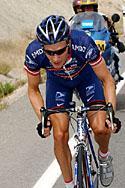
|
CN: Going back to the start of the season, what objectives had you set down for yourself in 2004?
DZ: I just wanted to have a good year and finish it out. I didn't really have too many specific goals because I was nervous I wasn't going to be how I used to be before I got in that accident, so it was kind of like wait and see how it goes, y'know.
CN: Was making the team for the Tour de France loosely connected in the back of your mind at all?
DZ: No, I don't think so... I was pretty much counting on the break there in July (laughs).
CN: Last time we spoke [December 2003], you were still coming out of that terrible crash in May. Then the following March, that was followed by another serious one in Redlands - how did that happen?
DZ: It was bad roads, a big pile-up... I woke up as I was getting on the helicopter; I instantly went unconscious, I don't even remember hitting the ground.
CN: Was it as serious as your previous accident?
DZ: I was just mentally frustrating. I had a concussion, a couple of bruises on my brain, but it wasn't as serious because I didn't break any bones, so I could come back a lot quicker from that one.
CN: How long were you off the bike for?
DZ: Only two weeks completely off, because you can't get your heartrate above a certain level once you've had a concussion, so you've got to let [the brain] heal.
A solid middle
CN: You made a strong comeback at the US Time Trial Championship - did that renew your confidence for a good second half of the season?
DZ: Yeah, definitely, that race did a lot for my confidence. And motivation - I trained really hard after that, did a lot of motor-pacing, really pumped myself back up to go back to Europe.
CN: You mentioned motor-pacing; Stuart O'Grady says that's all he does during the season - do you also find that to be the most effective form of training?
DZ: Yeah, it really helps; it's not always easy to find a good place to do it and someone that knows what they're doing to help out, but if you can do it all the time, that's pretty good.
CN: Everyone knows how competitive it is on US Postal to make the Tour team, but how hard is it to earn a place for the Vuelta?
DZ: It's not nearly as competitive, but after Nationals, I asked Johan [Bruyneel] what he had in mind for me for the second half of the season; he mentioned if everything goes to plan, [I'll race] the Vuelta, so I kind of had it in my mind that it was going to be on my schedule at that point.
CN: What was going through your mind entering this year's Vuelta for the second time - did you feel stronger and more confident than when you first rode it in 2002?
DZ: I definitely felt more confident, knowing what to expect as far as racing for that long, and as the race went on, I was feeling stronger than I had the first time I'd done it... it's definitely a different experience the second time 'round.
Victory at La Vuelta
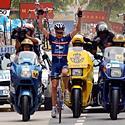
|
CN: Speaking about the eleventh stage of the Vuelta, when Johan Bruyneel ordered you to attack, were you surprised to see no-one else come across to you?
DZ: A little bit; he [Bruyneel] didn't order it - I just kind of wound it up from kilometre zero to try and get in some attacks, and it just happened the way it happened (laughs).
CN: When you saw no-one had come across or was going across to you, what was Johan telling you or what were you telling yourself?
DZ: The first few kilometres, I thought, 'Oh, I'll just stay out here and keep going, and the main break will catch me and I'll be in it.' But then [Alejandro] Valverde crashed and that kind of neutralised things back there.
CN: I'm interested to know what was going through your head during those 160 kilometres out on your own?
DZ: Quite a bit... There was a lot of dealing with the pain that was happening; I just kind of went back, reflecting on all the pain I'd been through with the accident, and told myself I can get through that pain. There was also some movies, songs... it was a lot of things. But it was hard - there was definitely intense concentration there.
CN: Were you conscious of making sure you were drinking and eating enough?
DZ: Yeah, I tried to do a lot of that in the beginning, before the feed zone [km 80]. I don't know how much I ate, but I tried to get a lot in there because I knew it'd be a long day. And I knew when I tried it at [Championship of] Zurich and it didn't work, it was because I ran out of energy, so I knew I had to take it in and eat a lot.
"I was really cold, I started to shake, I started throwing up..."- The infamous CSC 'boot-camp' |
CN: What sort of food were you eating?
DZ: Clif Bar after Clif Bar after Clif Bar... I didn't think I could eat too much, but near the end I did throw up a tiny bit (laughs a little), but you have to eat a lot.
CN: You said after the stage that "All day I had to try and not crack mentally". Is that the hardest thing when you're in that sort of situation?
DZ: Yeah, I think that's the main thing when you're in something like that, because you're all by yourself and you know the time gap's going to come down. I was expecting it to come down, so I told myself not to panic, and to stay steady.
CN: After your stage win, was that when CSC approached you?
DZ: No - I didn't really start talking to them until after World's.
An excellent end
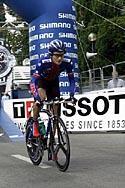
|
CN: You pulled out of the Vuelta a few days early - was it always your intention to pull out of the race a couple of days early to prepare yourself for the World Time Trial Championships?
DZ: No, I was always going to try and finish the Vuelta; it was probably better that I didn't, because those last stages were really, really difficult and it would have been hard to recover in time.
CN: You had roughly a week to go back home, refocus on the time trial, and head to Verona. Did it all feel like a bit of a rush?
DZ: Not really; the rest felt good, and I was really motivated for World's.
CN: How were you actually feeling on the day - were your aiming for the podium?
DZ: Yeah, for sure - I wanted to be on the podium.
CN: You were obviously on a very good ride because you missed out on fourth place by 2 seconds and a podium by 12 seconds; were you happy or disappointed with the result?
DZ: After I settled down a little bit, I was happy, but right after, you're never overjoyed to lose...
Signing for CSC: Easy as 1-2-3
CN: You mentioned CSC approached after the World's, so did Bjarne Riis speak to you in Verona?
DZ: No, I left after World's to come back to the States, but I had an agent in Europe working on finding teams for me.
CN: When your agent discovered CSC had some interest in you, did Postal try and match the offer?
DZ: No, they didn't try... they didn't want to match the offer.
CN: Bjarne Riis seems to have a knack of turning riders into champions, or previous champions back into champions, so what are your thoughts on working with him in 2005?
DZ: I'm pretty excited to see what he's like; I've never experienced it yet. From what I've seen, it seems like he's got something.
CN: Have you spoken with him yet; if so, what sort of things was he telling you?
DZ: Yeah, I spoke with him just before I signed with the team. He talked a little about the team, what their plans are the next few years.
CN: Did he mention how he sees you fitting into those plans?
DZ: He kind of came to the conclusion that I'd be doing to stage race program, but he said that could change. Things can always change if they need you somewhere else.
CN: Looking at your professional years so far, you haven't had a heavy race program, so is that one of your goals next year, to race a little more?
DZ: Yeah, I think that will definitely help me develop more, because when I do get over [to Europe] and race consecutively, that's when I see big jumps in my fitness and my racing.
Preparing for boot camp à la Riis
CN: Speaking about Bjarne Riis' December 'boot-camp' what has he said to you, other than that it's in Denmark and it's in two weeks' time?
DZ: Er, he said we'll have some fun... we'll see. I just read some things online, trying to get an idea of what I should pack - I don't think they'll try to kill us...
CN: Have they mentioned what to bring?
DZ: Yeah, they said to bring some swimwear and a toothbrush... and some cycling clothes. I think I might try to smuggle in a survival knife or something like that... (laughs)
CN: Is it easier knowing that they'll be two Americans, Bobby Julich and Christian Vandevelde, on the team next year? How well do you know them?
DZ: Yeah, somewhat; it's always nice to have some fellow countrymen around, if you can call them that, but I'm excited to meet all the rest of the new guys and try to make new friends. I know Christian pretty well - he was at Postal with me and we spent some time at the [Olympic] Training Center together - but I don't really know Bobby all that well, but he seems like a pretty nice guy.
"They [the team] really communicates with each other; they were really there to help you if you falter."- The unique bond that seems to develop between the riders at Team CSC |
CN: Where will you live next year - still in Girona?
DZ: I think I might move...
CN: Where do you think you'll go?
DZ: It's a secret [laughs]... maybe Turkey, maybe Chad, somewhere like that - the training's real good in Chad...
CN: So when do you leave for boot camp?
DZ: I leave on December 2nd and come back on the 10th, with the camp running from the 3rd to the 9th. We can talk a little more then - I'll probably be a hard-man after that (laughs)...
Post boot-camp: Hardened but softened
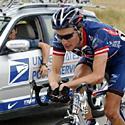
|
CN: So, how did it all go? Had you done anything like that before?
DZ: I've never been through anything like that before in my life... especially not on a cycling team!
CN: Scott Sunderland said he returned sore all over with blisters on his feet - was it really as bad as that?
DZ: Yeah, it was bad. We were wearing army boots, and I don't think any of those shoes fit anybody; we were doing a crazy amount of marching, hiking in the dark, wearing heavy backpacks. It was hard; I wasn't expecting it to be that hard. Everybody was exhausted. It gave me some respect for the military, that's for sure.
CN: Was B.S. Christiansen the hard-man he's made out to be?
DZ: I think he really can be, but I think he was easier on us than he would be on real soldiers. I don't think they were trying to kill us, but they wanted to get close (laughs).
CN: So you spent the whole week on the island, then?
DZ: No, we were eating lunch, and then the army guys came in and said: 'You have 10 minutes to get on this truck.' So we jumped on the truck, drove to an army base, took off all our regular clothes and put on army fatigues. And then it began... we split up into four teams, and went out into the woods.
CN: Did you experience a little bit of culture-shock going to Denmark ?
DZ: Not so much Denmark itself, but the new team. It's a lot more international but a lot more social; they just like to hang out a lot more with each other.
CN: So the camp was far harder than you expected it to be?
DZ: Yeah, you could say that... I actually didn't make it all the way through the survival camp. I got a flu shot, but on the second night, I couldn't function any more: I was really cold, I started to shake, I started throwing up... I just got super-sick, so they had to take me to hospital. They thought it might have been flu, but it could of been that I was really dehydrated and I wasn't completely used to the timezone. I kind of felt embarrassed.
CN: So during your first 48 hours, was there any stage when you were thinking, 'What the hell am I doing here?'
DZ: Not so much. I knew what we were doing and I knew what it was for. It was good to get to know the guys in that kind of situation. I think the best part about it was that we met afterwards as a team and talked about what happened. Nobody complained, everybody was really positive about it - it was really neat.
CN: How long did it take you to recover?
DZ: I feel I'm just barely getting back into the swing of things now. I was only in hospital for one night, but when I got back [to the camp], there was a drinking contest... it was initiation for all the new guys and new staff members. They just put a lot of alcohol in front of you: there was beer, some vials of some really strong alcohol... basically, there was a lot of throwing up...
CN: ... which I guess you were used to?
DZ: (laughs) Yeah, I said to myself, 'Well, it look's like I'll be doing this [vomiting] again...'
CN: What did you learn about yourself, and what did you learn about your new team-mates?
DZ: They [the team] really communicate with each other; they were really there to help you if you falter. When I started having trouble in the woods, it was pretty shocking to me how they all came to my side.
CN: Surely this bodes well for you guys when you start racing as a team?
DZ: Yeah, I think these exercises will translate well into the racing [environment], for sure.
CN: Did Bjarne Riis have a chance to go through each individual's race program?
DZ: Everybody got their racing schedule, but I think we'll talk more about that stuff at the next camp in Italy. I'm going to start out in France with [Etoile] Besseges, Tour of the Med, Tirreno-Adriatico, Setmana Catalana, and just keep building up until the Giro.

